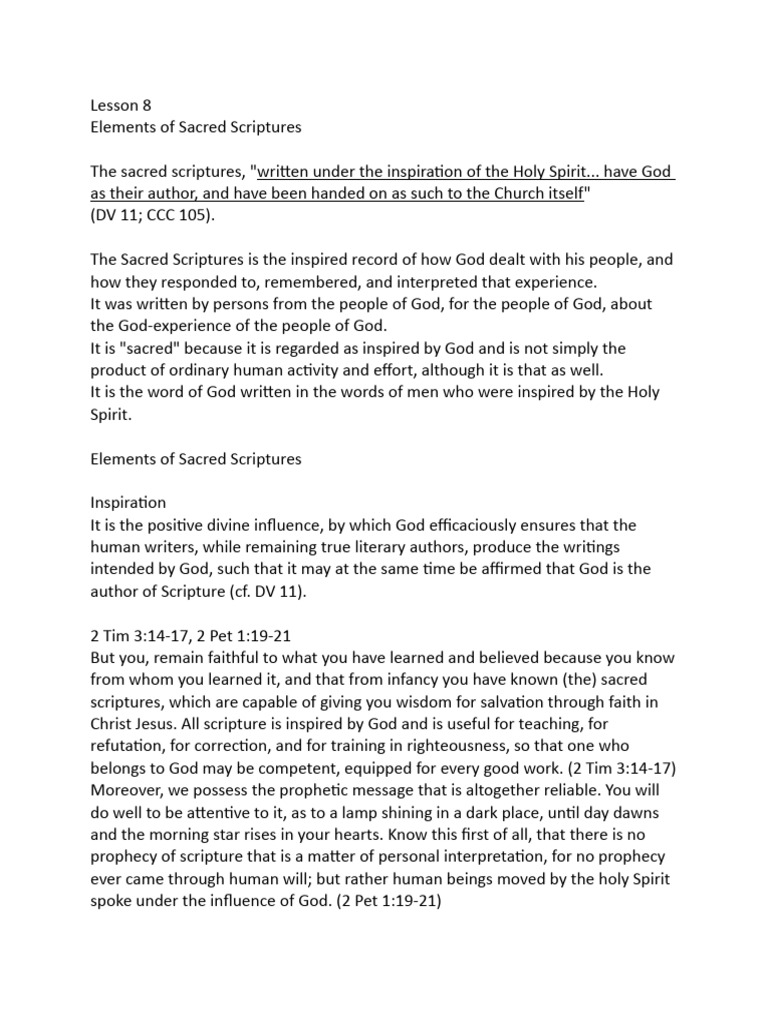In the vast expanse of human civilization, scripture occupies a hallowed space, akin to a lighthouse guiding mariners through tempestuous seas. For Bahá’ís, the elements that imbue scripture with sacredness are multifaceted. These teachings not only envisage the inherent beauty and wisdom contained within sacred texts but also elucidate their profound significance in the quest for spiritual enlightenment. To explore what makes scripture sacred within the Bahá’í framework is, therefore, to embark on a journey that intertwines spirituality, history, and the very fabric of human understanding.
The Bahá’í Faith considers scripture as the divine utterance manifested through human language, an echo of the ineffable. The distinction between human writing and divine revelation forms a crucial cornerstone of Bahá’í belief. To label scripture as sacred is to accept that it embodies not merely the words of prophets but their divine inspiration, an outpouring of wisdom drawn from the Infinite Source. Such texts are regarded as vehicles of spiritual illumination, bridging the gap between the human condition and the transcendental.
Furthermore, sacred scripture serves as a repository of guiding principles, akin to a compass that navigates believers through the vicissitudes of existence. Within the Bahá’í tradition, scriptures are deemed vital in instilling a moral and ethical framework. The teachings of Bahá’u’lláh, the founder of the Bahá’í Faith, articulate principles of justice, equality, and universal love. This moral imperative, couched in divine wisdom, renders scripture an essential tool for societal reformation, urging humanity to cultivate a collective consciousness that transcends the ephemeral.
The sacredness of scripture is further accentuated by its prophetic lineage. The Bahá’í Faith posits that all religious texts are interlinked chapters in a larger narrative of divine guidance. Historical figures, such as Moses, Jesus, Muhammad, and the Báb, are viewed as sequential manifestations of God’s will. This continuity imbues scripture with a sense of legacy, with each text serving as a testament to humanity’s evolving understanding of the divine. Like a multi-faceted gem, scripture refracts truths that resonate across cultures and epochs, inviting seekers to reflect on their spiritual ancestry.
Moreover, the role of interpretation within the Bahá’í Faith cannot be overstated. Sacred scriptures are likened to a deep well, with layers of meaning that require diligent exploration. Bahá’ís are encouraged to delve beyond the superficial layers to uncover deeper truths and principles. This interaction between the reader and scripture fosters a dynamic relationship, wherein understanding blossoms through contemplation and inquiry. Just as a sculptor chisels away at raw marble to reveal a masterpiece, so too does sincere engagement with scripture unveil profound insights.
The unique appeal of Bahá’í scripture lies in its inclusiveness. The teachings emphasize the oneness of humanity and the universality of religious truth. Unlike many religious traditions that may foster exclusivity, Bahá’í scriptures champion a holistic perspective, asserting that all faiths share a common foundation. This approach invites believers from various backgrounds to find solace and unity in shared truths, facilitating societal harmony and interfaith dialogue.
Scripture, within the Bahá’í context, is also seen as a catalyst for personal transformation. It provides a framework for spiritual development, signaling the stages of growth along the path of righteousness. The verses resonate on a personal level, urging individuals to cultivate virtues such as patience, humility, and altruism. Engaging with sacred writings becomes a transformative process, shaping character and fostering resilience against the tempestuous currents of life.
Additionally, the communal aspect of scripture within Bahá’í practice reinforces its sacredness. The act of gathering to read and discuss holy texts fosters a collective spirit of inquiry and shared growth. These gatherings are akin to an intellectual feast where minds converge to explore the depths of divine wisdom. The communal engagement with scripture not only deepens individual understanding but also strengthens the bonds of unity among believers, reinforcing the notion that scripture cultivates both personal and collective spiritual growth.
Moreover, the Bahá’í teachings elucidate the concept of the “living” scripture. The idea is that scripture goes beyond the written word, as it is ever-active and dynamic, influencing the lives and decisions of its adherents. It responds to the needs of humanity, adapting to the evolving context while maintaining its core essence. In this sense, scripture is not a static relic but a vibrant force that continues to inspire and guide, transcending generations and cultural boundaries.
In conclusion, the sacredness of scripture within the Bahá’í Faith is a rich tapestry woven from threads of prophecy, moral guidance, personal and communal transformation, and inclusivity. The reverence for sacred texts reflects an acknowledgment of the divine presence interspersed throughout human history. Like an ever-persistent stream flowing towards the ocean of divine unity, Bahá’í sacred scriptures invite all seekers to immerse themselves in the depths of spiritual wisdom. As individuals grapple with life’s profound mysteries, scripture remains an unwavering beacon, illuminating the path towards enlightenment and eternal truth.
